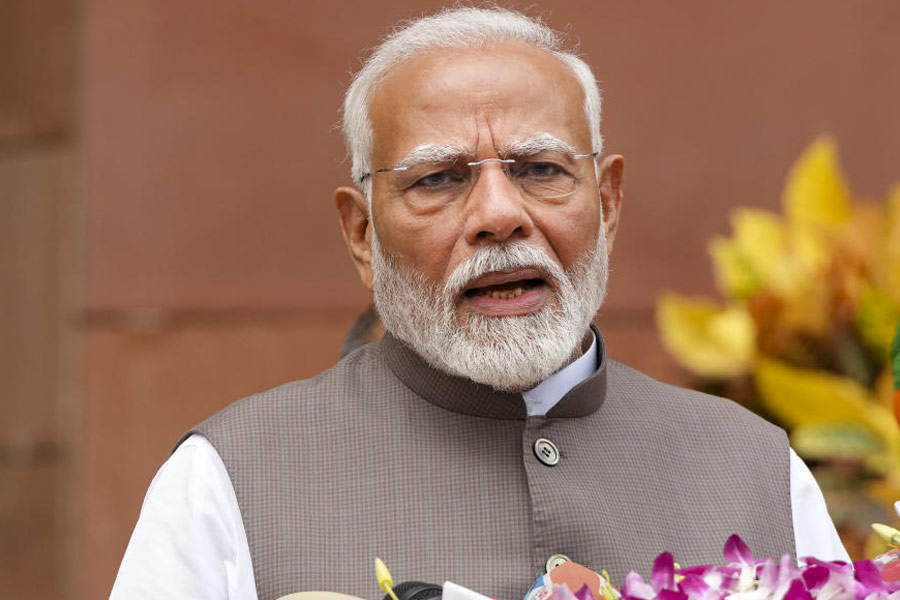The Dragon may start to dance all over again.
The Narendra Modi government may be ready to cast aside its hostile attitude towards China and begin to forge closer economic ties with the neighbour as it strives to push a Viksit Bharat agenda.
The first sign of a thaw in the frosty relations between the two Asian giants is evident from the suggestion made by chief economic adviser V. Anantha Nageswaran in
the Economic Survey for 2023-24 that in order to boost exports, India should either integrate into China’s supply chain or promote foreign direct investment (FDI) from the dragon nation.
The CEA’s suggestion is the first real attempt to try and roll back a thinly disguised policy formulated just over four years ago to deter Chinese investments in India.
India has always frowned on deepening economic ties with China, especially after a series of border skirmishes in 2017 strained ties with Beijing.
The Survey seems to suggest that it may be time to take a closer look at that policy.
Nageswaran suggests that India could benefit by leveraging the so-called “China plus one” strategy that global multinationals have pursued over the past five years. Over the past two decades, China has built and positioned itself as the world’s factory.
But ever since Covid broke out and relations between the US and China soured, the MNCs had started to hedge their risks by scouting for alternative FDI destinations.
“India faces two choices from the China plus one strategy,” the Survey says. “It can integrate into China’s supply chain or promote FDI from China.”
“This is a complete U-turn of the Modi government’s policy towards China. From a policy of exclusion through scrutiny, the Economic Survey is proposing an open-arms FDI inflow policy. The suggestion in the Survey is a realisation that Chinese leadership in several sectors like electric vehicles, semiconductor chips and artificial intelligence cannot be ignored. And for the country to benefit, it needs to attract them,” said Biswajit Dhar, distinguished professor at the Council for Social Development.
Not everyone agrees with Nageswaran’s proposition.
Ajay Srivastava, co-founder of GTRI, said: “The Economic Survey hints that India should emulate the strategies of countries like Mexico, Vietnam, Taiwan and Korea. However, shifting geopolitical dynamics challenge this notion. It will not be the best strategy for India considering the evolving geopolitics and India’s long-term interests.”
He reckoned that with Donald Trump likely to return for a second term as US President, India could be caught in a crippling cross-fire. In March, Trump had said he was prepared to escalate the trade war and target the Chinese automobile industry, which is reportedly looking to use Mexico as a gateway for car exports to America.
Policy change
If India decides to accept the CEA’s suggestion, it will signal a major policy change.
Back in April 2020, relations with China were badly frayed after India put in place a thinly disguised mechanism to stop Chinese investors from scooping up stakes in Indian companies.
A press note put out by the department for the promotion of industry and internal trade (DPIIT) had said that foreign investments from countries that share a common border with India would require government approval.
The note, which did not explicitly name China, said the change in the FDI policy with respect to its immediate neighbours was designed to curb “opportunistic takeovers or acquisitions of Indian companies due to the… the Covid-19 pandemic”.
The move to introduce a heightened level of scrutiny of investment proposals from China led to a drying up of funds flows from the world’s second largest economy.
Data from the DPIIT shows that in the period between April 2000 and 2024, FDI worth only $2.5 billion has come in from China, placing it 22nd in the FDI league table.
“The world cannot completely look past China even as it pursues China plus one,” the Survey says, which sounds like an admission that it has been economically unwise to spurn Beijing.
The Survey says that China is India’s biggest trade partner. Imports from China in 2023-24 topped $101.7 billion while India exported goods worth just $ 16.6 billion, leaving a yawning trade deficit of $85 billion.
“As the US and Europe shift their immediate sourcing away from China, it is more effective to have Chinese companies invest in India and then export the products to these markets rather than importing from China, adding minimal value, and then re-exporting them,” the Survey says.










